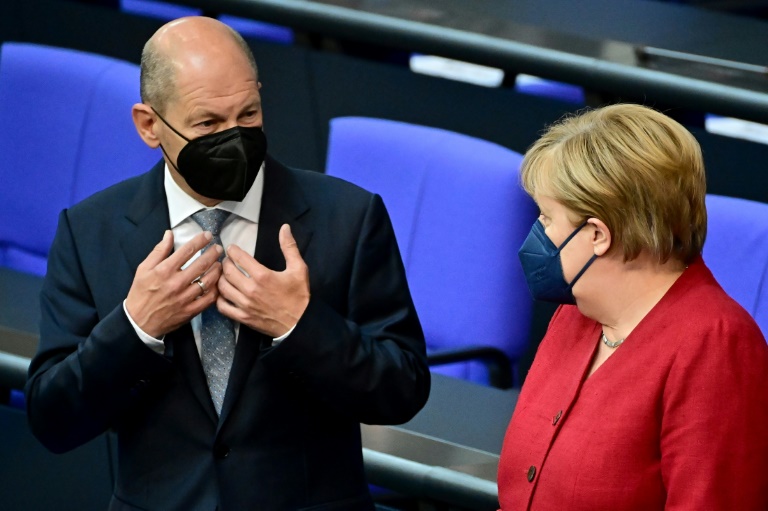Germany’s Greens and the liberal FDP party said Wednesday they had chosen to start three-way coalition talks with the centre-left Social Democrats (SPD), dealing a blow to Chancellor Angela Merkel’s conservatives.
The move puts the Social Democrats’ Olaf Scholz a step closer to the chancellery after his party came first in last month’s general election with 25.7 percent of the vote, followed by Merkel’s centre-right CDU-CSU bloc at 24.1 percent.
For either party to head the next German government it would need the support of the centre-left Greens and the pro-business Free Democrats (FDP), which placed third and fourth in the polls.
Despite leading the conservatives to their worst ever election result, beleaguered CDU leader Armin Laschet has not given up hope of replacing outgoing Merkel. But surveys suggest Germans would rather see Scholz, who is also finance minister and vice chancellor, in the top job.
Green co-leader Annalena Baerbock told reporters that after preliminary talks with the SPD and CDU-CSU, the Greens “believe it makes sense… to have in-depth talks with the SPD and FDP”.
Baerbock said Germany, the EU’s most populous country and its biggest economy, faced “great challenges” and needed “a new beginning”.
“This country can’t afford a lengthy stalemate,” she said.
The FDP then held its own press conference to announce that it had accepted the Greens’ proposal to swiftly move on to the phase of formal exploratory coalition talks with the SPD.
The first such three-way talks with Scholz and his fellow SPD negotiators will start on Thursday, FDP leader Christian Lindner said.
The Greens and the FDP are not natural bedfellows, diverging on key issues including taxation, climate protection and public spending.
But the kingmaker parties have repeatedly said they also have common ground and want to “build bridges” in order to govern.
All sides are eager to avoid a repeat of the 2017 election aftermath, when the FDP dramatically walked out of coalition talks with the conservatives and the Greens and it took months for a new government to take shape.
– ‘Not a done deal’ –
A tie-up of the SPD, Greens and FDP, which would be a first in Germany, has been dubbed a “traffic light” constellation after the parties’ red, green and yellow colours.
Green co-leader Robert Habeck, speaking alongside Baerbock, said that while the party shared some common ground with the conservatives, there are “significant differences” too.
Informal talks over the last few days revealed “more overlap” with the Social Democrats, he said, on issues like climate protection, social justice and European integration.
The Greens’ clear preference for a Scholz-led government is another setback for Laschet, whose political future hangs in the balance after the poll drubbing.
Gaffe-prone Laschet, once seen as a shoo-in for the top job, fell out of favour with voters after he was caught laughing during a tribute to victims of Germany’s deadly floods in July.
He was also criticised on election night for claiming the right to try to form a coalition government after leading the conservatives to their lowest score in post-war German history, and for being slow to congratulate Scholz on his victory.
Nevertheless, the FDP was at pains to stress that the conservatives were not out of the running yet.
The FDP’s Lindner said a coalition of the CDU-CSU, FDP and the Greens — known as the “Jamaica” alliance because the parties’ colours match that country’s flag — “remains a viable option for us”.
The FDP has served as the junior partner in a conservative-led government before, and they share a dislike for tax hikes, red tape and a relaxation of Germany’s strict debt rules.
The Greens’ co-leader Habeck also cautioned that “nothing is a done deal yet”.
Merkel herself is bowing out after 16 years in power, although she will stay on in a caretaker capacity throughout the coalition haggling.










